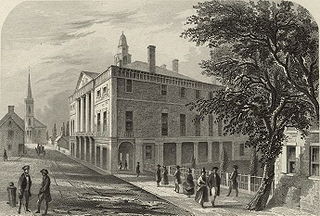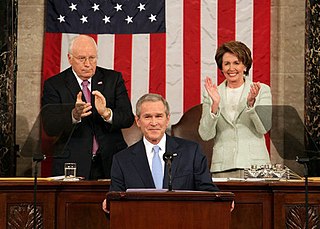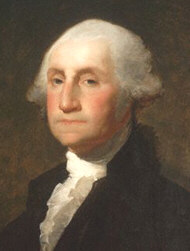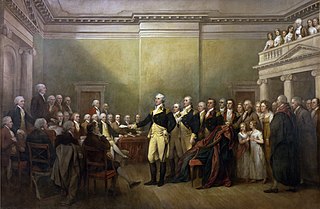
George Washington was an American Founding Father, military officer, politician and statesman who served as the first president of the United States from 1789 to 1797. Appointed by the Second Continental Congress as commander of the Continental Army in 1775, Washington led Patriot forces to victory in the American Revolutionary War and then served as president of the Constitutional Convention in 1787, which drafted and ratified the Constitution of the United States and established the U.S. federal government. Washington has thus been known as the "Father of the Nation".

The State of the Union Address is an annual message delivered by the president of the United States to a joint session of the United States Congress near the beginning of most calendar years on the current condition of the nation. The State of the Union Address generally includes reports on the nation's budget, economy, news, agenda, progress, achievements and the president's priorities and legislative proposals.

The 1st United States Congress, comprising the United States Senate and the United States House of Representatives, met from March 4, 1789, to March 4, 1791, during the first two years of George Washington's presidency, first at Federal Hall in New York City and later at Congress Hall in Philadelphia. With the initial meeting of the First Congress, the United States federal government officially began operations under the new frame of government established by the 1787 Constitution. The apportionment of seats in the House of Representatives was based on the provisions of Article I, Section 2, Clause 3, of the Constitution. Both chambers had a Pro-Administration majority. Twelve articles of amendment to the Constitution were passed by this Congress and sent to the states for ratification; the ten ratified as additions to the Constitution on December 15, 1791, are collectively known as the Bill of Rights, with an additional amendment ratified more than two centuries later to become the Twenty-seventh Amendment to the United States Constitution.

The Copyright Act of 1790 was the first federal copyright act to be instituted in the United States, though most of the states had passed various legislation securing copyrights in the years immediately following the Revolutionary War. The stated object of the act was the "encouragement of learning," and it achieved this by securing authors the "sole right and liberty of printing, reprinting, publishing and vending" the copies of their "maps, charts, and books" for a term of 14 years, with the right to renew for one additional 14-year term should the copyright holder still be alive.
The "Plan for Establishing Uniformity in the Coinage, Weights, and Measures of the United States" was a report submitted to the U.S. House of Representatives on July 13, 1790, by Secretary of State Thomas Jefferson.

The International Copyright Act of 1891 is the first U.S. congressional act that extended limited protection to foreign copyright holders from select nations. Formally known as the "International Copyright Act of 1891", but more commonly referred to as the "Chace Act" after Sen. Jonathan Chace of Rhode Island.

A joint session of the United States Congress is a gathering of members of the two chambers of the bicameral legislature of the federal government of the United States: the Senate and the House of Representatives. Joint sessions can be held on any special occasion, but are required to be held when the president delivers a State of the Union address, when they gather to count and certify the votes of the Electoral College as the presidential election, or when they convene on the occasion of a presidential inauguration. A joint meeting is a ceremonial or formal occasion and does not perform any legislative function, and no resolution is proposed nor vote taken.
The response to the 2006 State of the Union Address was delivered by Virginia Governor Tim Kaine on January 31, 2006, after United States President George W. Bush delivered his 2006 State of the Union address. The theme of Kaine's speech, "A Better Way", advocates the Democratic Party's policies and states' rights. Kaine delivered the speech from Virginia's historic Executive Mansion in Richmond and the speech was televised nationwide.

George Washington (1732–1799) commanded the American Revolutionary War (1775–1783), and was the first president of the United States, from 1789 to 1797. In terms of personality, leading Washington biographer Douglas Southall Freeman concluded, "the great big thing stamped across that man is character." By character, says David Hackett Fischer, "Freeman meant integrity, self-discipline, courage, absolute honesty, resolve, and decision, but also forbearance, decency, and respect for others." Because of his central role in the founding of the United States, Washington is often called the "Father of his Country". His devotion to republicanism and civic virtue made him an exemplary figure among American politicians. His image has become an icon and is commonplace in American culture.

The presidency of George Washington began on April 30, 1789, when Washington was inaugurated as the first president of the United States, and ended on March 4, 1797. Washington took office after the 1788–1789 presidential election, the nation's first quadrennial presidential election, in which he was elected unanimously by the Electoral College. Washington was re-elected unanimously in the 1792 presidential election, and chose to retire after two terms. He was succeeded by his vice president, John Adams of the Federalist Party.

The 2007 State of the Union Address was given by the 43rd president of the United States, George W. Bush, on January 23, 2007, at 9:00 p.m. EST, in the chamber of the United States House of Representatives to the 110th United States Congress. It was Bush's sixth State of the Union Address and his seventh speech to a joint session of the United States Congress. Presiding over this joint session was the House speaker, Nancy Pelosi, accompanied by Dick Cheney, the vice president, in his capacity as the president of the Senate.

The 2002 State of the Union Address was given by the 43rd president of the United States, George W. Bush, on January 29, 2002, at 9:00 p.m. EST, in the chamber of the United States House of Representatives to the 107th United States Congress. It was Bush's first State of the Union Address and his third speech to a joint session of the United States Congress. Presiding over this joint session was the House speaker, Dennis Hastert, accompanied by Dick Cheney, the vice president, in his capacity as the president of the Senate.

The drafting of the Constitution of the United States began on May 25, 1787, when the Constitutional Convention met for the first time with a quorum at the Pennsylvania State House in Philadelphia, Pennsylvania to revise the Articles of Confederation. It ended on September 17, 1787, the day the Frame of Government drafted by the convention's delegates to replace the Articles was adopted and signed. The ratification process for the Constitution began that day, and ended when the final state, Rhode Island, ratified it on May 29, 1790.

The first inauguration of George Washington as the first president of the United States was held on Thursday, April 30, 1789, on the balcony of Federal Hall in New York City, New York. The inauguration was held nearly two months after the beginning of the first four-year term of George Washington as president. Chancellor of New York Robert Livingston administered the presidential oath of office. With this inauguration, the executive branch of the United States government officially began operations under the new frame of government established by the 1787 Constitution. The inauguration of John Adams as vice president was on April 21, 1789, when he assumed his duties as presiding officer of the United States Senate; this also remains the only scheduled inauguration to take place on a day that was neither January nor March.
The 1992 State of the Union Address was given by the 41st president of the United States, George H. W. Bush, on January 28, 1992, at 9:00 p.m. EST, in the chamber of the United States House of Representatives to the 102nd United States Congress. It was Bush's third and final State of the Union Address and his fourth and final speech to a joint session of the United States Congress. Presiding over this joint session was the House speaker, Tom Foley, accompanied by Dan Quayle, the vice president, in his capacity as the president of the Senate.
In American politics, the response to the State of the Union address is a rebuttal speech, often brief, delivered by a representative of an opposition party following a presidential State of the Union address. When the president is a Democrat, the rebuttal is typically given by a Republican, and vice versa.

The state of union is an address, in the United States, given by the president to a joint session of Congress, the United States House of Representatives and United States Senate. The United States constitution requires the president "from time to time give to the Congress Information of the State of the Union." Today the state of the union address is given as a speech, though this is not a requirement of the constitution. George Washington chose to address the congress in a speech annually; on October 25, 1791 he gave his third speech.

George Washington's resignation as commander-in-chief marked the end of Washington's military service in the American Revolutionary War and his return to civilian life at Mount Vernon.

Donald Trump's farewell address was the final official speech of Donald Trump as the 45th President of the United States, delivered as a recorded, online video message on January 19, 2021. The farewell address was delivered the day before Joe Biden, who defeated him in the 2020 United States presidential election, was sworn in as his successor. Trump was the first president to not attend his successor's inauguration since Andrew Johnson in 1869.
The presidency of George Washington began on April 30, 1789, when George Washington was inaugurated as the first president of the United States, and ended on March 4, 1797.













